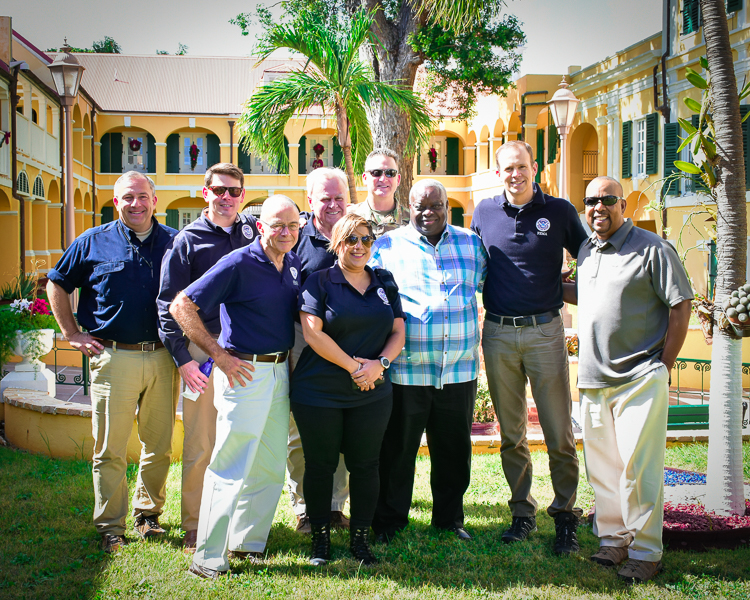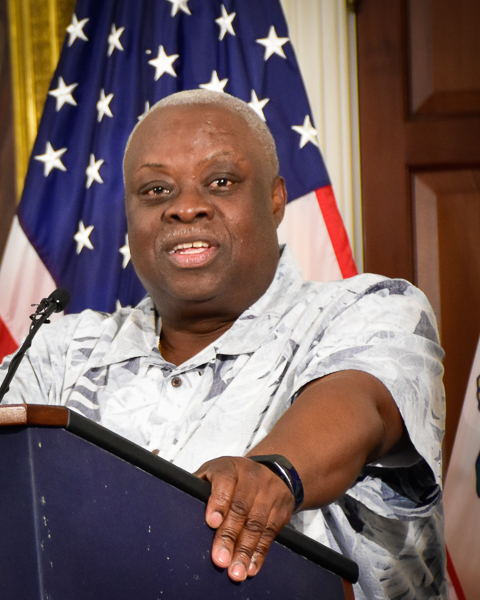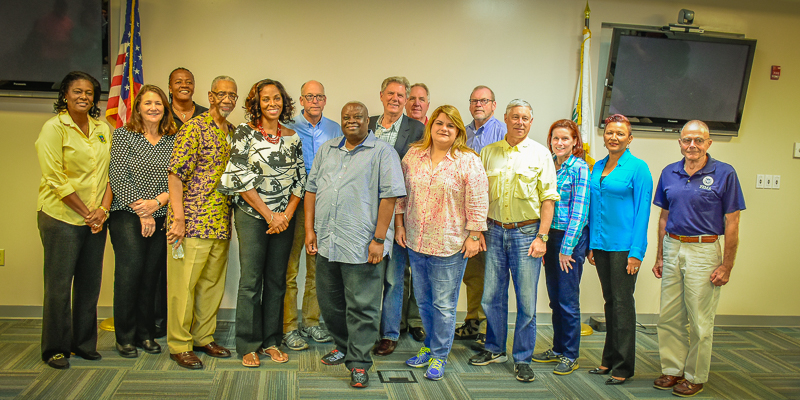US Virgin Islands Hotel & Tourism Association
 Governor Mapp Meets with FEMA Administrator on St. Croix
Governor Mapp Meets with FEMA Administrator on St. Croix
Gov. Kenneth E. Mapp told Federal Emergency Management Agency Administrator William “Brock” Long Dec. 5 that the territory requires more assistance in repairing homes and helping renters.
Many Virgin Islanders live in rental units or family-owned apartments, rendering the occupants ineligible for some forms of assistance and FEMA needs to adapt some of its policies to better assist both renters and landlords, the governor said. More options for temporary housing must also be identified.
The governor said the Sheltering and Temporary Essential Power program, which allows for up to $25,000 for temporary repairs so residents can shelter in place, must be better integrated with the program that subsidizes permanent repairs for up to $75,000. He said the money and time would be better spent on rebuilding for the long haul as opposed to doing a quick fix designed to last only a few months.
“As is, it restrains the ability to help the community,” the governor said. “We need to connect the dollars.”
Mapp asked what more FEMA could do to assist the territory in repairing the roads ravaged by the recent hurricanes. Long pledged to look into it as current policy limits FEMA to debris removal on streets designated as federal highways.
The governor continues to underscore that FEMA ought to place greater emphasis on long-term resiliency in its response to Hurricanes Irma and Maria.
“Each disaster is an opportunity to become more resilient,” Mapp said. “The key for the community is what are we going to do to mitigate this level of destruction going forward.”
Long, who leads FEMA nationwide, agreed that more emphasis must be placed on hardening the infrastructure of communities. He asked the governor to place his concerns in an official letter in the “spirit of improving policy.”
“What you are talking about makes sense,” Long said.
He added that more than 25 million Americans had been impacted by disasters over the past few months and that FEMA was working hard to help prepare communities to handle future emergencies, to include training local residents through its temporary jobs program.
“We are building you a network of emergency managers here on the island,” Long said.
The governor thanked the administrator for returning to the territory and said that he deeply appreciated the level of support the Virgin Islands had received thus far.
Long said he would continue to do all he could to assist the Virgin Islands both on the ground and in Washington, D.C.
“We are ‘United in Hope’ with you,” he said, referring to the territory’s official motto.
Governor Mapp Reports Strong Progress with Recovery
 Gov. Kenneth E. Mapp described the official opening and dedication of Magens Bay on St. Thomas this on Dec. 7 with Royal Caribbean International as a “great, great sign of progress.”
Gov. Kenneth E. Mapp described the official opening and dedication of Magens Bay on St. Thomas this on Dec. 7 with Royal Caribbean International as a “great, great sign of progress.”
Addressing reporters at Government House on St. Croix on Dec. 4, the governor thanked the cruise company for being so invested in the restoration of the iconic attraction and extended thanks to Commissioner of Tourism Beverly Nicholson-Doty and her team for their work to reopen Magens Bay.
Mapp anticipates the 65th anniversary of the Crucian Christmas Festival will be a “robust” one. The village will be on St. Croix around Dec. 17 for three weeks. The governor said a number of organizations, including some in the private sector, are working with the government to put together a Crucian Christmas Festival night on each island. He encouraged residents to use the Festival to shed their worries: “It’s for everyone to come out and just simply relax … get in some spirit of stress release.”
As the U.S. Virgin Islands recovery continues, Mapp said the territory will demonstrate that the working relationship between the local and the federal governments is very productive in managing the response to natural disasters.
However, he also acknowledged that many residents are still in need after the devastation left by the hurricanes and thanked his as well as the entire FEMA team for their support of the Virgin Islands’ recovery efforts. He reminded residents: “This is going to be a long process, but we can demonstrate by the evidence and the data … that every day is better than the day before and that we are making progress.”
The Virgin Islands Water and Power Authority continues to make headway in restoring power across the Virgin Islands, including the restoration of street lights on main thoroughfares. There are currently 711 linemen from outside the territory supporting WAPA. An additional group of 100 linemen are expected to arrive within the week.
Mapp has instituted a weekly meeting at Government House with the leadership of WAPA, the Department of Public Works, the Virgin Islands Waste Management Authority, the Department of Planning and Natural Resources, and consultants working with WAPA. These meetings will help to ensure the goals of all agencies are aligned.
The Department of Property and Procurement will begin repairs to Route 40 on St. Thomas and St. John on Dec. 14. The Scott Free Road Phase One/Bridge Replacement (Access Route 405) and the Crown Bay Road (Route 33 and 304) Pedestrian and Drainage Improvement projects will commence on Dec. 18.
Residents were again encouraged to exercise caution on the roadways and to pay attention to the many potholes which can cause damage. The governor assured residents that the roads in the territory will be repaired, however rains and limited resources have been affecting the progress. He emphasized that patching the roadways is not a permanent solution.
The governor said that $120 million of the territory’s $7.5 billion request to Congress included was identified for damage to the road systems throughout the Virgin Islands.
The Virgin Islands Port Authority has advised that mold remediation is coming to an end at the Cyril E. King Airport on St. Thomas.
The approximately 600 residents who did not qualify for the Blue Roof program will be able to access the sheltering-in-place repair program, which provides as much as $25,000 per household. He will write a letter designating the U.S. Virgin Islands Housing Finance Authority as the lead agency that will administer the Sheltering and Temporary Essential Power Program. The governor said Witt O’Brien’s, whose contract was approved by the Public Finance Authority last week, will handle the rollout of this program and announcements will be made where residents can apply.
Reporting on the Disaster Supplemental Nutrition Assistance Program, Mapp said the Department of Human Services processed more than 30,000 applications. More than 27,500 households were eligible, and nearly 57,000 people are covered. The approved benefits, which is a two-month allotment, totals $26.1 million. There are about 350 remaining cards to be funded. The benefits are good for one year.
Congressional Delegation Tours St. Croix
 The U.S. Virgin Islands requires the help of Congress in order to rebuild a stronger and more resilient infrastructure, Gov. Kenneth E. Mapp said Dec. 3.
The U.S. Virgin Islands requires the help of Congress in order to rebuild a stronger and more resilient infrastructure, Gov. Kenneth E. Mapp said Dec. 3.
Speaking to a visiting congressional delegation representing the House Committee on Energy & Commerce, the governor said that more resources are required than provided for under current laws. Eight members of Congress and several administration officials visited St. Croix in order to assess the damage to the territory and the ongoing recovery effort.
“If there is one thing I ask, it’s that you seriously consider amending the Stafford Act,” Mapp said. “We don’t just need to rebuild, we need more mitigation and to rebuild for the future.”
The Stafford Act affords assistance to rebuild in the event of a disaster, but not necessarily to make any improvements. The governor is pushing hard to allow enough funding to improve existing infrastructure, particularly the electrical system. He told the members of the Energy & Commerce Committee it will cost $380 million to rebuild the USVI’s electrical system and $850 million to rebuild a system that is much more impervious to storms. The governor is pushing to have all primary and secondary lines buried underground, to create microgrids and to develop more renewable energy sources.
He said such an electrical system would allow the territory to get quickly on its feet in the event of future disasters, prevent economic disruption and greatly reduce the distress to residents caused by prolonged power outages.
Virgin Islands Water and Power Authority Director Julio Rhymer and Energy Office Director Elmo Roebuck echoed the governor’s sentiments. Rhymer told the congressional delegation WAPA was advocating for both burying lines and for the use of composite, rather than regular wooden, electrical poles. Although they are more expensive, they are built to withstand 200 mile per hour winds.
“We want to build a hardened system,” Rhymer said.
Mapp also requested that Congress allow for more flexibility in the use of Federal Highway Funds. He explained that as a territory, rather than a state, the U.S. Virgin Islands was limited in the amount of emergency funds it could be granted by the U.S. Department of Transportation and that it would cost upwards of $3 million just to repair the islands’ traffic lights.
Mapp’s messages resonated with members of the congressional delegation.
“These formulas have to change so you are treated like states,” said Ranking Committee Member Frank Pallone, who helped lead New Jersey’s long recovery from Hurricane Sandy. “It’s not only important that we are here today, but that we follow up.”
Energy & Commerce Committee Chairman Greg Walden said that Congress had learned much as a result of the Virgin Islands recovery effort.
“My biggest take away here is – let’s build it back right,” Walden said. “God bless you for hanging in there during this real hard time…Thank you for your level of leadership.”
The delegation toured Frederiksted, stopping briefly at the hurricane ravaged Arthur Richards Junior High School and the solar farms in Clifton Hill and Orange Grove, the latter of which was destroyed by Hurricane Maria despite being further from the eyewall. Mapp has pointed out that the design and construction at Clifton Hill was clearly superior and should serve as an example going forward.
Those visiting St. Croix Dec. 3 included Rep. Greg Walden (R-OR), Rep. Fred Upton (R-MI), Rep. Gene Green (R-TX), Rep. Morgan Griffith (R-VA), Resident Commissioner Jenniffer González-Colón (R-PR), Rep. Frank Pallone (D-NJ), Rep. Bobby Rush (D-IL), Rep. Diana DeGette (D-CO) and Virgin Islands Delegate Stacey Plaskett, whose office coordinated the tour.
Power Restoration Amps Up Across U.S. Virgin Islands
Power restoration is “expected to spike” over the next two weeks as many significant neighborhoods are nearly ready to be energized, Gov. Kenneth E. Mapp said Dec. 1 following a detailed briefing on both power restoration and debris removal.
The governor requested updates on each neighborhood on St. Thomas, St. John and St. Croix, with specific concerns about concentrated population areas, schools, churches and recreation centers.
“Tell me about Louis E. Brown Villas along the highway where the seniors live – we have to get them energized,” the governor asked.
Clinton Hedrington Jr., the Virgin Islands Water and Power Authority’s Electric System Chief Operating Officer, reported that Louis E. Brown was one of the many areas expected to receive power this weekend.
Another 100 linemen will join the 760 working in the territory next week, according to WAPA. Power restoration throughout the Virgin Islands remains at about 43 percent, with a large number of new areas expected to be energized as repairs are completed to major transmission lines.
“Ninety percent restoration by Christmas remains the target,” the governor said.
Following the neighborhood by neighborhood assessment of power restoration, the governor requested that streetlighting be made a priority and suggested that at least some lights be fixed in all areas of the island.
“I want you to concentrate on the main thoroughfares, but make sure that we at least get some street lights up throughout the territory,” he said.
The governor remains frustrated with the pace of debris removal and met with members of the administration and contractors Dec. 1 in order to discuss both removal and the final disposal of hurricane debris.
Mapp stated that the vast majority of organic hurricane debris will likely be chipped and composted, however, given the need to meet federal timelines, all options for disposal must remain open to the Virgin Islands Government, to include a small amount of controlled burning.
“Expenses for debris removal will be covered by the federal government, however, if we want them to pay for it, it must be done in a specific time frame,” the governor said. “We have to be realistic about our ability to manage all this material.”
Administration officials are working this weekend on finalizing a multi-pronged approach for disposing of hurricane debris and preserving the maximum amount of the territory’s valuable hardwoods.
Agriculture Commissioner Carlos Robles said that more than six weeks ago he formally requested that the Army Corp of Engineers assist in separating hardwoods such as mahogany, tibbet, lignum vitae, genip and ironwood from the rest of the hurricane debris.
“The mahogany is being extracted from the debris piles as we speak,” Robles said.
The commissioner indicated that a plan for distributing the tropical hardwood was in the works and that the department would make an announcement as to when community groups or individuals could arrange pick up. “We are identifying sites to store it now,” he said.
Mapp said the debris and power restoration team would meet with him weekly at Government House until the territory had been fully energized and the majority of debris had been cleared away.
“Friday’s meeting was very productive,” the governor said. “We have the information we need to be able to plan and to help manage the public’s expectations.”
Senators Authorize FEMA Community Disaster Loan Essential to Meet GVI Obligations
Gov. Kenneth E. Mapp thanked members of the 32nd Legislature of the Virgin Islands for authorizing the territory’s government to enter into a Federal Emergency Management Agency Community Disaster Loan. Senators approved the government’s borrowing initiative during a Dec. 1 session.
“By their affirmative vote, senators have strengthened the cash liquidity of the Virgin Islands Government at a most critical time,” the governor said. “Our vital public services can be sustained.”
The funds will be used to finance existing essential functions of the government’s operations, including, but not limited to, the operations of the Juan F. Luis Hospital and Medical Center, the Roy Lester Schneider Regional Medical Center, the Virgin Islands Waste Management Authority and the University of the Virgin Islands.
U.S. Virgin Islands Finance Commissioner Valdamier Collens said he was encouraged that the legislature had made progress on this important measure.
“I would like to express my profound gratitude to senators for advancing this legislation and we look forward to reviewing the final bill as amended,” Collens said.
